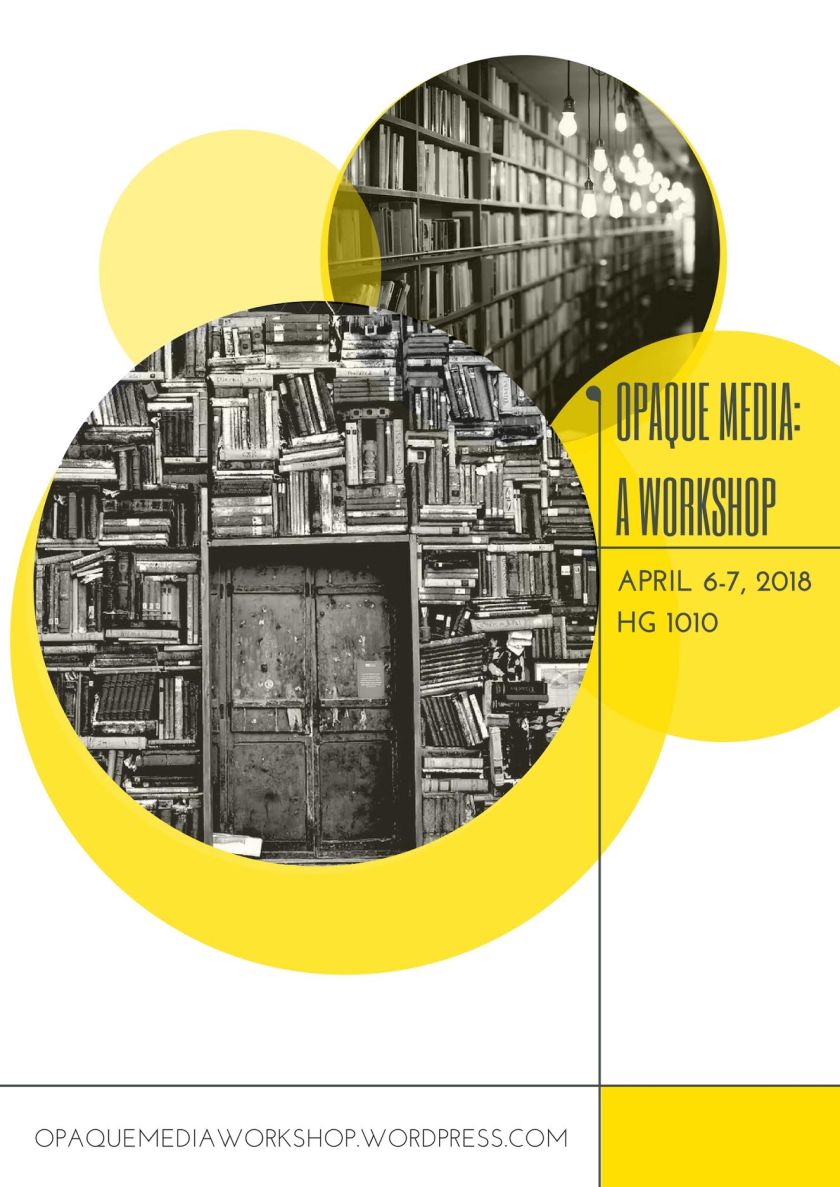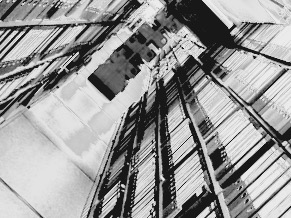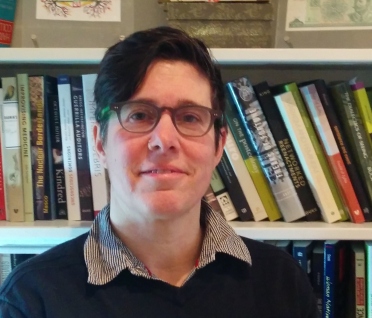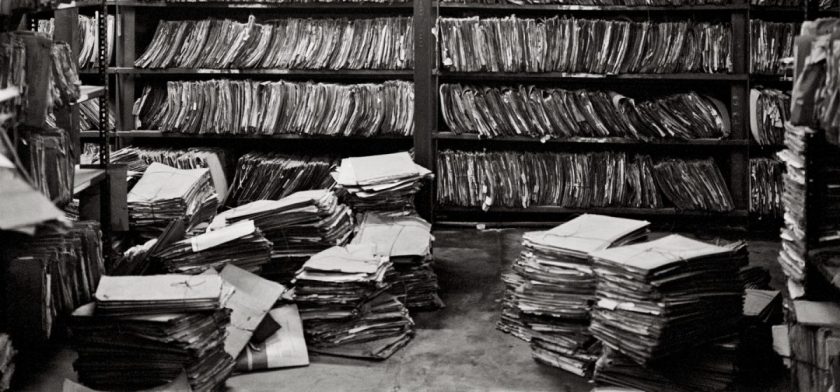
We are pleased to announce the schedule for “Opaque Media: A Workshop,” to be held at UC Irvine April 6-7, 2018. We have twenty-two presenters over two days, representing sixteen universities, and ten disciplinary backgrounds across the human, social, and information sciences. Below you will find the schedule for the workshop, participant information, as well as links to their presentation abstracts.
This event has been made possible through the generous contributions of UCI’s Humanities Commons; the Digital Humanities Working Group; the UCI Libraries; the Departments of Comparative Literature, English, Gender & Sexuality Studies, Informatics, and Spanish & Portuguese; the Center for Latin American Studies; and Postmodern Culture.
Opaque Media: A Workshop
Friday, April 6, 2018—Humanities Gateway 1010
09:00-09:30am—Breakfast
09:30-11:00am—Pre-Reading Discussion Session
This session will begin with participants reflecting on what, in the Call for Papers for Opaque Media, appealed to their interests, as well as what they found to be flaws, gaps, or blindspots built into the Call. Afterwards, participants and workshop attendees will collectively think through four texts drawn from media studies, history, cultural studies, and information theory. The packet for the Pre-Reading Discussion can be accessed by clicking here).
11:15-12:30pm—Panel 1: Archiving and Transmitting
Julia Gelfand, UC Irvine, University Library & Anthony Lin, Irvine Valley College, School of Languages and Learning Resources, “Grey and Opaque Is the New Translucence: Is It Frosted or Stained Glass?”
Kim Fortun, UC Irvine, Department of Anthropology, Mike Fortun, UC Irvine, Department of Anthropology, & Lindsay Poirier, Rensselaer Polytechnic Institute, Department of Science and Technology Studies, “Particulate Matters: Archiving Air, Environmental Health Governance, and the Depositivist Style”
12:30-01:30pm—Lunch
01:30-02:45pm—Panel 2: Grey Il/legibility
Tahereh Aghdasifar, Emory University, Institute of Liberal Arts, “Negating Empathy, or: How to Be Illegible in Your i-589 Petition for Asylum”
Chris Malcolm, UC Irvine, Department of Comparative Literature, “Environmental Violence and the Management of Harm”
03:00-04:15pm—Panel 3: Unstable Media, States of Instability
Daniel Grinberg, UC Santa Barbara, Department of Film & Media Studies, “Extracting Secrets: Covert CIA Operations and Documentary Practices”
Ritika Kaushik, University of Chicago, Department of Cinema & Media Studies, “Indeterminacies of Bureaucratic Film: State Sponsored Film Infrastructure at the Time of Emergency in India”
Joshua Weiss, UC Davis, Department of Anthropology, “Tremendo Paquete: Media Circulations of & within Cuban Imaginaries”
04:45-06:15pm—Keynote [Humanities Instructional Building 135]
Michelle Murphy, University of Toronto, Professor of History & Women and Gender Studies, “Gaslighting, Settler Colonialism, and Data Justice”
Gaslighting is a term from psychology that names a form of abuse that causes one to question their sanity and their sense of the reality of the world. How might we see corporate and government grey media as a form of gaslighting, as part of strategies that seek to violently rearrange the sense of the world. Taking as its example the online distribution of environmental monitoring data in Canada—both industry self-reported and state-generated—this talk traces the ways grey media and practices of gaslighting have become core tools of the Settler Colonial State. Moreover, in this moment of intensified corporate capture of the state, the politics of grey media have become critical to data justice and decolonizing struggles.
Professor Murphy’s website: https://technopolitics.wordpress.com
06:30pm—Reception
Saturday, April 7, 2018—Humanities Gateway 1010
09:30-10:00am—Breakfast
10:00-11:15am—Panel 4: Genres of the Bureaucratic
Nathan Coben, UC Irvine, Department of Anthropology, “The Equity of Redemption: Grey Remediation of the Irish Mortgage”
Leah Horgan, UC Irvine, Department of Informatics, “Geospatial Arguments for Housing Resources in Los Angeles”
Anna Weichselbraun, Stanford University, Center for International Security and Cooperation, “The Boring Document: Semiosis, Abduction, and Affective Effects”
11:30-12:45pm—Panel 5: Maintaining Places
Brandon Benevento, University of Connecticut, Department of English, “Flat Roofs and Long Leases: Technologies of Maintenance at the American Strip Mall”
Katherine Sacco, UC Irvine, Department of Anthropology, “Planning the University: Contingent Epistemologies in Development Plans”
Meredith Sattler, Cal Poly San Luis Obispo, Department of Architecture/Virginia Tech, WAAC, “Hiding the Biosphere 2 Enclosure Experiment in Plain View”
12:45-02:00pm—Lunch
02:00-03:15pm—Panel 6: Grey Governance/Fictions of Order
Williston Chase, UC Irvine, Department of Comparative Literature, “Bureaucratic Nonsense”
James R. Goebel, UC Irvine, Department of Comparative Literature, “Grey Literature, Green Governance: Visual Resource Management and the American Colonial Landscape”
03:30-04:45pm—Panel 7: Land | Law | Control
cindy lin, University of Michigan-Ann Arbor, School of Information, “Accuracy for Carbon: Vision, Control, and Cartography”
Samantha McDonald, UC Irvine, Department of Informatics, “Digital Grey Media in Citizen-Representative Communication and Advocacy”
Skyler Reidy, University of Southern California, Department of History, “Making Space for the State: Surveys and Land Claims in Nineteenth-Century California”
05:15-06:00pm—Wrap-up Discussion Session
06:00pm—Reception


